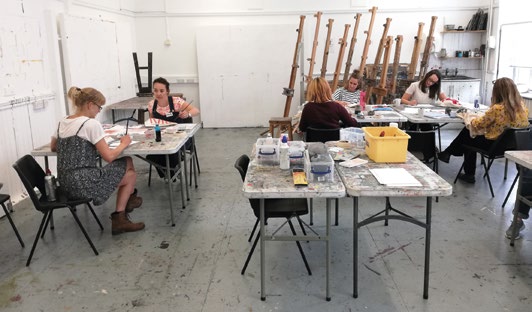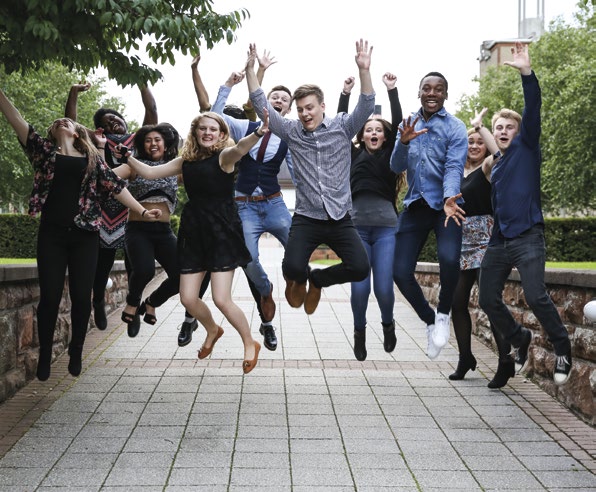
Bristo Square – that great public space bookended by the late-Victorian grandeur of McEwan Hall and the 1970s straight-lines of Potterow – opened in 1983 to mark the University of Edinburgh’s 400th birthday.
For many people arriving after crossing George IV Bridge from the north, the square is their first encounter with the University. It is open and accessible. The buildings are arched around the central circular arena, as if beckoning everyone in.
Well, that’s one interpretation. Here’s another.
“Most groups we work with don’t think Bristo Square is for them,” says Melanie Smith, one of the University’s widening participation managers. She works with children in the city’s primary and secondary schools. “Same with George Square or Old College. They think they can’t walk across it. They just don’t see our spaces as part of their city.”
Getting into the University of Edinburgh has always been hard. Entry requirements and competition for places are high. It is a dynamic that befits its profile as one of the world’s top universities.
Edinburgh has an equally long history of finding ways to ensure that talent is the defining reason why someone is offered a place, rather than material means. Over the years, many barriers to entry have been torn down.
But many remain. As their nature and specificity are changing, so too is the University’s response.
Laura Cattell is the University’s Head of Widening Participation. She came into post in 2016 and launched the University’s strategy in 2018.
“For me, widening participation is about two things,” she says. “One is making sure that we as an institution are more representative of wider society. We are a huge influencer – we need to make sure our voice is able to speak for a diverse range of people.
“The other thing is removing the barriers and creating opportunities for as many people as possible. Our Principal often says that if you agree that talent is equally distributed across society, then why would we wish to just work with only a small section of it?”
If people face barriers getting to University, we want to try to remove those and make it as wide an opportunity as possible.
Laura CattellHead of Widening Participation
Edinburgh is not working in isolation. In 2017, the Scottish Government set the target that by 2030, students from the 20 per cent most deprived backgrounds should represent 20 per cent of entrants to higher education as a whole.
There are several milestones to be met en route, including that by 2021 at least 10 per cent of full-time first degree entrants come from these deprived areas. Edinburgh met this target three years early.
This is not the only area where the University is going beyond what it is tasked with.
Whereas the Scottish Government targets are focused on entry into university, Edinburgh’s strategy has four strands looking at the whole student journey. It begins with dispelling myths and raising aspirations in school children, even as early as primary school, followed by supporting talented students to get in with flexible admissions and financial support. Once they arrive, students
are supported to succeed. Finally, there is support for graduates to progress into careers that befit their talent.
This is why the University doesn’t talk about widening access – which is just one facet – but widening participation.
For Edinburgh to be genuinely successful, the whole institution needs to take responsibility, and as our Widening Participation strategy states: “We all have a role to play in making this happen”.
“That is incredibly challenging in somewhere this size, but we have to recognise the immense collateral when we work together,” she says. “This is not just one team dealing with this; this is up to 15,000 staff and 35,000 students. Everyone needs to get on board – and so far we’ve had brilliant engagement from staff, students, alumni and wider supporting networks.”

So, beyond the strategy, what is the University doing practically to widen participation? According to Laura, they have learned from research that although they are a valuable and critical aspect to widening participation “scholarships are not the golden ticket, and neither is contextual admissions”.
In recognition that educational disadvantage starts at a young age, the University runs more than a dozen projects engaging with school-age children. These include Educated Pass, which works with local football clubs; well-established partnerships such as the Lothian Equal Access Programme for Schools, which provides advice for students traditionally under-represented in higher education; and new programmes such as YourEd (see opposite page).
Laura stresses that these projects are not explicitly recruiting students for the University of Edinburgh. It is about broadly raising aspirations and ensures that students realise that higher education could be an option for them.
“There is a motivation to do this work from a community engagement perspective as well seeing it contributing to social mobility more broadly,” she says. “It shows a maturity and confidence on our part, but I want to be clear that what we are doing is not charitable work. We benefit hugely from this work – we get to know and understand our local communities, our schools, and most critically we get to meet talented learners and their families who go on to enrich our student population with their range of life experiences. We would miss out if we didn’t engage and nurture this talent.
“It benefits society at large. It’s a common sense thing to do.”
I’m pretty clear that what we are doing is not charitable work. We would miss a trick if we didn’t do this. It benefits us hugely.
Laura Cattell
As part of its commitment to widen participation for students across the UK, not just Scotland, the University has announced the creation of Access Scholarships. The scheme – worth between £1,000 and £5,000 per year of study – comes into effect for 2020 entry and replaces several existing funds, simplifying the process.
Students who have an experience of being in care or are estranged from their parents will automatically receive the maximum amount.
This move is one of many that recognise that certain groups need particular support. “It recognises the immense strain that not having family support can have when you are starting university,” says Laura.
For this particular cohort, a member of the widening participation team meets the students before they start to ensure they have the means to travel to Edinburgh and money to buy the essentials once they arrive. “It’s not uncommon in the past for those students to bring their stuff in bin liners,”says Laura.
Other groups have specific barriers that need torn down. For asylum seekers and refugees, language is a major issue. Therefore, the widening participation team helps run homework clubs and English language lessons for Syrian refugee children.
For students on the Asperger’s spectrum, the buzz of welcome week can be overwhelming and harm orientation. To help, they are invited to start a week early, with tailored sessions showing them around campus.
And the Insights Programme continues to help students to develop the confidence, skills and connections to consider a range of careers through introductions to alumni working in a wide range of sectors and environments. The Programme is funded by alumni donations and is on course for further expansion, with more student participants and alumni volunteers, and by taking place in more countries around the world.
There is much more to come too. Plans are afoot to create widening participation programmes for students across the world, building on the success of the Mastercard Foundation Scholars Programme, which provides scholarships to African students with huge potential and little means.
Other schemes in development include bespoke mental health support for widening participation students and foundation years to aid entry into the more selective and challenging courses such as medicine.
The University is up for the ever-changing challenge of tearing down the obstacles that prevent people from realising that Edinburgh – Bristo Square and all – is for them.
“As we break down these barriers, we will discover new ones,” says Laura. “We should be ready and able to respond. And we will be. As society changes, we will keep evolving.”
Transforming young lives

Melanie Smith says: “I’ve seen the transformation. I have seen those who go from being a little school pupil aged 15 standing outside Old College, all nervous and not wanting to talk to anyone, to being a qualified professional brimming full of confidence.
“It’s phenomenal.”
Melanie has witnessed many metamorphoses during her years as part of the University’s widening participation team. In 2018 she was appointed to launch YourEd, a new scheme that intends to change more lives through the University partnering with 12 schools.
“We see it as an interface between the University and the schools, so that they could have access to our resources,” she says. “As a partner school, they should feel like an extension of the University.”
YourEd was established because the University realised that some schools were falling through the gaps. They were either not covered by Scotland’s network of widening participation schemes or were not a priority school within one.
Melanie’s team then worked with the selected schools – all within a 50-mile radius of Edinburgh – to create a bespoke service based on their needs, strengths and situations to deliver whatever was necessary to raise the aspirations of those pupils.
In its first year, YourEd’s activities have included campus visits for students, sessions with pupils on how to write personal statements and fill in UCAS forms, and a conference about life at the University for S3 pupils.
The ambition is to scale up and roll out the YourEd model beyond the areas surrounding Edinburgh.
Melanie hopes it will increase the number of nervous 15 year olds from every kind of background entering university.
“You then hope they will go out and diversify into whatever occupation they choose and pay it forward,” she says.
“Widening participation – and YourEd – is just saying ‘you are welcome here’. It is about making sure those that want to, and are able, can.”
Further information
If you would more information on supporting widening participation at the University, drop a line to David Haines at david.haines@ed.ac.uk

